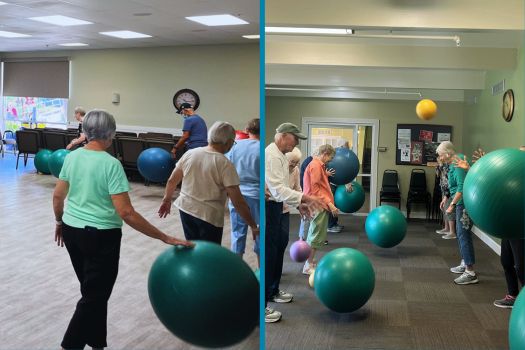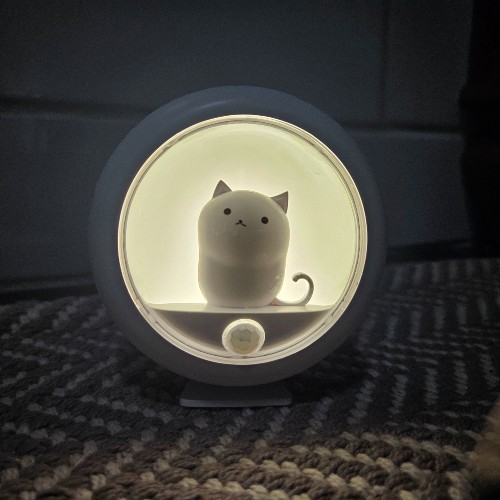Aging Gracefully: The Importance of Balance and Fall Prevention in Senior Health
Our ‘senior years’ can creep up on us, and we might not think about the fact that our body’s needs change (or we would rather not think about it!). Nevertheless, as we age, it becomes increasingly important to prioritize our health and well-being. One key area that is often overlooked is the significance of balance and fall prevention.
It’s common for people not to talk about falls; they may think it’s a normal part of the aging process and there is nothing they can do about it, or they may not be aware of some common fall risk factors. For others, they may not talk about falls they have already had for fear of losing their independence.
However, the ability to confidently move about our day and maintain stability is crucial for maintaining an independent and fulfilling lifestyle. Contrary to what some may think, there are simple, proactive measures seniors can incorporate into their daily routines, significantly reducing the risk of falls and allowing them to enjoy the benefits of aging gracefully.
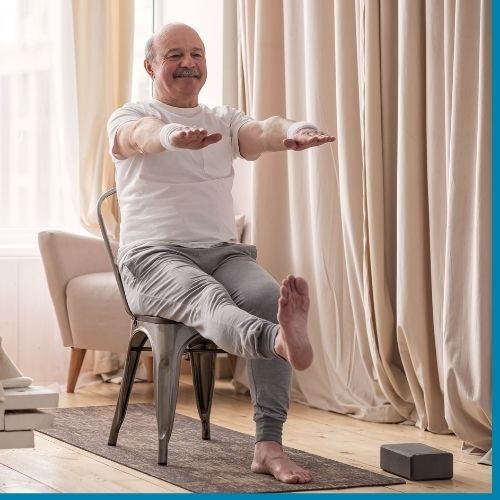
In this article, we will explore the importance of balance and fall prevention, uncover practical tips and exercises that promote stability, and discover how a proactive approach to leading a healthy lifestyle can enhance our overall well-being. So, let's dive in and embark on a journey toward a safer, healthier, and more balanced future!
Understanding the Effects of Aging on Balance
As we age, our bodies undergo various changes that can affect our balance. Sometimes these changes happen over a long period of time, and other times they happen suddenly due to a change in their medical condition or starting a new medicine, for example.
Primary factors that can affect balance and mobility in seniors
In fact, some medications cause your body to metabolize other medications differently, regardless of age. So be sure to discuss all your medications with your healthcare providers so that they can identify potential interactions and adverse side effects when adding a new medication to your regimen.
By recognizing these age-related changes and unique challenges, we can take proactive measures to minimize the risk of falls and promote overall well-being.
Read More: 10 Fall Risk Factors for Seniors
The Consequences of Falls for Seniors
Falls are a significant concern for seniors, as they can have severe consequences on both physical and psychological levels. Physically, falls can result in fractures, sprains, and other injuries that can lead to prolonged pain and reduced mobility. These injuries can significantly impact daily activities, making it challenging to perform essential tasks independently. Moreover, falls can also result in hospitalization and a decline in overall health.
Psychologically, falls can profoundly affect seniors' confidence and mental health. The fear of falling again can lead to anxiety and social withdrawal, further contributing to a sedentary lifestyle and reduced quality of life. As mentioned earlier, some seniors may hesitate to tell anyone about a fall for fear of losing their independence, but that’s the opposite of the truth. By addressing fall risk head-on (no pun intended), seniors can improve their balance and stability to maintain their independence even if they have already had a fall.
It is crucial to address both the physical and psychological consequences of falls to ensure that seniors can maintain an active, independent, and fulfilling lifestyle as they age.
How exercise plays a role in fall prevention for seniors
Exercise plays a vital role in fall prevention. Regular physical activity can help improve strength, balance, flexibility, and coordination, all of which are essential for maintaining stability and preventing falls. Engaging in exercises that target these areas can significantly reduce the risk of falls and enhance overall health.
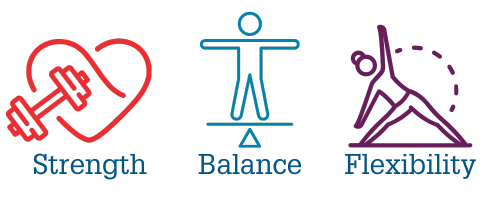
Strength training exercises, such as lifting weights or using resistance bands, can help build and maintain muscle mass and strength, reducing the risk of falls caused by weakness. Balance exercises, such as standing on one leg, can improve stability and body awareness/depth perception. Flexibility exercises, such as stretching or dance classes, can help maintain joint mobility and prevent stiffness that could affect balance. Finally, aerobic exercises like walking or swimming can improve cardiovascular health and overall fitness, reducing the risk of falls.
Exercises to improve balance in seniors
There are various exercises that seniors can incorporate into their daily routines to improve balance and reduce the risk of falls. These exercises can be performed at home or under the guidance of a qualified fitness professional.
Note: Before starting a new exercise program, it’s important to talk to your healthcare provider to ensure it is safe for you to do so and to start slowly - gradually increasing the intensity and duration of the exercises to avoid injury.
One simple exercise to improve balance is the heel-to-toe walk. Seniors can practice walking in a straight line, placing the heel of one foot directly in front of the toes of the other foot with each step. This exercise helps improve balance and coordination. Another effective exercise is the single-leg stand. Seniors can practice standing on one leg for a few seconds, gradually increasing the duration as they gain strength and stability. Wall push-ups, where seniors stand a few feet away from a wall and push against it with their hands, can also help improve upper body strength and balance.
“Knowing the different body planes can be useful in designing your workout program to ensure you’re moving and strengthening your body in all directions. The three anatomical body planes can describe how your body moves when you engage in exercise or other activities. Understanding how your body works can help with developing well-balanced strength.” ~ Michelle Cadena, Wellness Director, Fellowship Square Tucson.
In addition to these exercises, dance classes such as Zumba or line dancing for seniors are fun and effective ways to improve balance and fall prevention. These activities provide both physical health and mental health benefits through social interaction, engagement in the community, and mental stimulus.
Other strategies to prevent falls
Apart from exercise, seniors can adopt other practical strategies to prevent falls and promote balance in their daily lives. One often overlooked strategy is maintaining a clutter-free and well-lit living environment. Removing tripping hazards such as loose rugs, cords, and clutter can significantly reduce the risk of falls.
Ensuring that rooms are well-lit, especially in high-risk areas such as staircases and bathrooms, can also contribute to fall prevention. For nighttime, try using nightlights. If you’re a light sleeper and prefer to sleep in total darkness, consider purchasing motion-activated nightlights, eliminating the need to keep a light on all night. Many motion-activated devices are available in the market today at a wide range of price points.
Installing handrails or grab bars in the bathroom and using nonslip mats can provide additional support and enhance safety. Seniors may also consider using mobility aids such as walkers or canes to provide additional support and stability. It is crucial to consult with a healthcare professional or occupational therapist to determine the most appropriate assistive devices for individual needs.
Wearing appropriate footwear with non-slip soles and good arch support is also crucial for maintaining stability. Regular vision and hearing check-ups can help detect any changes affecting balance and coordination. It is important to address any potential issues as soon as possible to prevent falls.
Making simple modifications to the home environment can go a long way in enhancing safety and preventing falls in seniors.
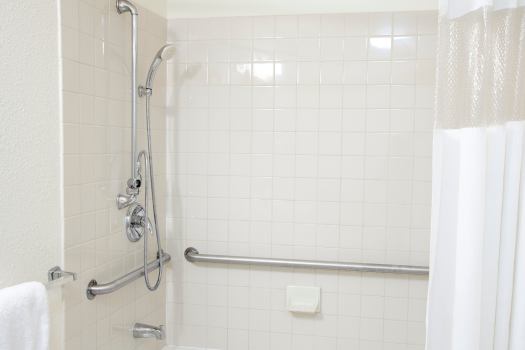
A balanced diet and healthy aging
Maintaining a balanced diet is crucial for overall health and well-being at any age, but it is especially important for seniors as it plays a key role in balance and fall prevention. A diet rich in fruits, vegetables, whole grains, lean proteins, and healthy fats provides essential nutrients and supports optimal physical function. Adequate calcium and vitamin D intake is particularly important for maintaining bone health and reducing the risk of fractures. Seniors should consult with a healthcare professional or registered dietitian to ensure they meet their nutritional needs.
Our body’s ability to retain water diminishes as we age, so staying well-hydrated is essential for seniors year-round. Dehydration can increase your risk for heat exhaustion, dizziness, or lightheadedness. Thirst is your body’s way of telling you you’re dehydrated, so it’s important to stay hydrated throughout the day – don’t wait until you feel thirsty to drink! Proper hydration supports optimal physical and cognitive function, reducing the risk of falls.
The role of healthcare professionals in fall prevention
Healthcare professionals play a crucial role in fall prevention in seniors. Regular check-ups with a primary care physician or geriatric specialist can help identify any underlying health conditions or medications that could increase the risk of falls. These professionals can provide guidance on exercise programs, assistive devices, and home modifications tailored to individual needs.
Occupational therapists can assess the home environment and recommend adaptations to enhance safety and prevent falls. Physical therapists can design personalized exercise programs to improve strength, balance, and coordination.
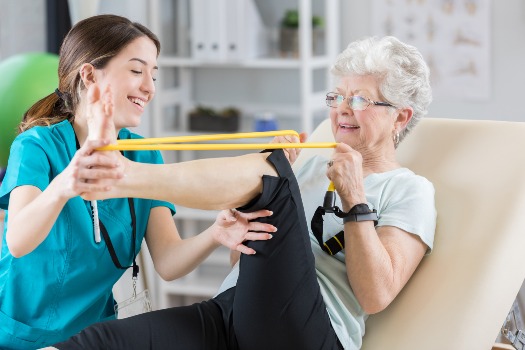
Rachel Colsch, Director of Outpatient Rehab at Fellowship Square Tucson, explains further, "Physical and Occupational therapy work together to help create a safe environment and a strong body to improve your ability to complete not only the daily task but also your hobbies, joys, and adventures!"
Pharmacists can review medications and provide recommendations to minimize any side effects affecting balance and stability. A multidisciplinary approach involving various healthcare professionals can ensure comprehensive fall prevention and help seniors maintain their independence.
Tying it all together: Embracing a proactive approach to reducing fall risk in seniors
By understanding the effects of aging on balance and addressing the risk factors, seniors can take proactive measures to prevent falls and maintain their stability and independence. Regular exercise, including strength training, balance exercises, flexibility exercises, and aerobic activities, can significantly reduce the risk of falls. In addition to exercise, adopting practical strategies such as maintaining a clutter-free environment, using appropriate footwear, and using assistive devices can further enhance safety.
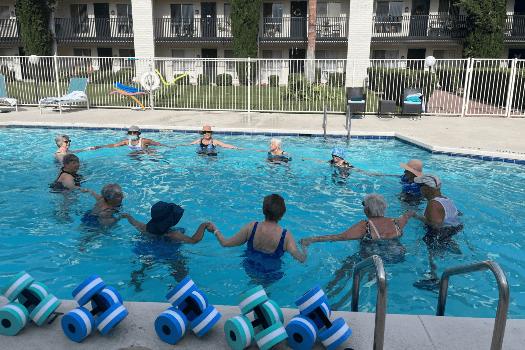
By embracing a balanced and active lifestyle, seniors can age gracefully, remain independent, and enjoy a fulfilling and vibrant life. It is always possible to prioritize balance and fall prevention, so let's take the first step toward a safer, healthier, and more balanced future.
Ready to learn more about Senior Living at Fellowship Square Tucson?
Here, you will find a friendly, vibrant, and supportive retirement community that values your well-being and happiness. We understand the importance of building friendships, sharing talents, and living with purpose.
Don't wait to enjoy your independence. Call us at 520-886-5537 or email us now to schedule a tour and discover the countless benefits of senior living at Fellowship Square Tucson!

